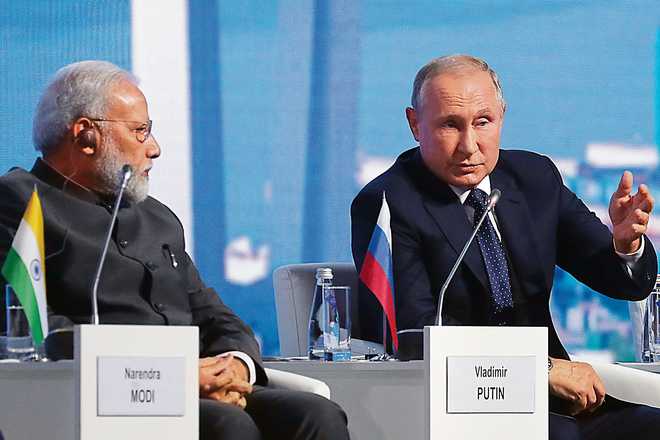MK Bhadrakumar
Former Ambassador
There is a deafening silence in Delhi following the first meeting of the Quadrilateral Dialogue (Quad) forum since its upgrade to the foreign ministers’ level in New York on September 27. External Affairs Minister S. Jaishankar’s participation at the meeting, doubtless carried PM Narendra Modi’s imprimatur. There was full-court Indian attendance at the Quad meet, with the incumbent and future foreign secretaries also present.
Typically, there is no joint Quad statement, while participants gave their own accounts. This time around, however, the MEA website is silent. The silence presumably signals that India wants to keep its head below the parapet. But Washington has gone to town, celebrating the upgrade. The State Department said that the New York meeting served “to discuss collective efforts to advance a free, open, and inclusive Indo-Pacific.” It added, “The four countries (US, Japan, Australia and India) reaffirmed their shared commitment to close cooperation on maritime security, quality infrastructure and regional connectivity in support of a rules-based order that promotes stability, growth and economic prosperity.”
At a subsequent ‘bilateral’ between the External Affairs Minister and Secretary of State Mike Pompeo, Quad again figured. The US readout said that they “discussed plans to advance our complementary visions of a free and open Indo-Pacific region following the successful Quadrilateral Consultations on the margins of the UN General Assembly last week.” The Quad serves a unique purpose for Washington, as its European allies (or the western alliance system) or the ASEAN will have nothing to do with the US agenda to ‘contain’ China.
Jaishankar since began tweeting to downplay the significance of the Quad’s upgrade. Perhaps, the Americans jumped the gun with the disclosure about Quad’s institutionalisation in their anxiety to grab the slippery Indian eel, which makes a great meal.
The fact of the matter is that the international furore over the Kashmir question puts Indian diplomacy on the defensive and when the US proposed the Quad upgrade, it became a godfatherly offer that India simply couldn’t afford to refuse. The US has ordered Delhi to take ‘rapid action’ to roll back the draconian measures in J&K and respect human rights; mainstream American media has been lambasting the Modi government; top Democratic presidential candidates speak up on the J&K situation; the House of Representatives plans to hold a hearing on October 22 in Washington, DC; and President Trump’s mediation offer lies on the table.
Washington staged a diplomatic coup by upgrading and institutionalising the Quad at a juncture when Delhi is simply not in a position to resist. Delhi has downplayed the upgrade, but regionally across Asia — and internationally — the perception has grown that the US-led Quad chariot is getting habitation and a name finally, with India coming on board at a watershed event to take it in a direction that Washington was raring to go — an Asian NATO.
Expediency may form part of diplomacy, but not when core interests are at stake. This is one such defining moment. China is a hugely consequential relationship, China’s rise is irreversible and India needs to come to terms with it. But Indian policies are zigzag, while step by step it is getting drawn into the US containment strategy against China. Each baby step is followed by prevarication that nothing much has happened to compromise India’s independent foreign policies.
But things add up. In a fit of choler, India turned its back on the Belt and Road Initiative, which seriously curbs engagement with China. The Quad will now degrade the quality of India’s strategic communication with China.
Modi should heed his friend Vladimir Putin’s advice. On October 3, a week after the New York event, President Putin made his most extensive remarks on the Quad. Importantly, Putin acknowledged that he had India on his mind while making the remarks. He underscored that given the “centrality” of the ASEAN in the Asia-Pacific (which, by the way, Delhi too repeatedly affirms) and the “network structure” existing around that grouping, a “bloc-based organisation” like Quad doesn’t make sense. Putin asserted that it is “un-Asian” if someone were to “create some kind of a bloc-based organisation… (that) is at odds with the current state of affairs in Asia.”
Interestingly, he added that he knows for a fact that the Asian countries themselves seek to “create a network of cooperation… move forward together taking into account each other’s interests and seeking and finding compromises” instead of getting involved in “confrontation between any states” or being part of any bloc.
Then came the punchline. Putin stated that the containment of China is “impossible by definition” and “anyone trying to do so will realise it is impossible, and will certainly only hurt himself in the course of such an attempt.”
Therefore, Putin invited India, “which is one of the countries closest to us in the world and especially in Asia”, to work with Russia by joining the efforts to create “an environment of friendly cooperation and to search for common security systems” in the Asia-Pacific region instead of identifying with a scenario that will inevitably turn out to be “destructive and harmful.”
Putin made the above prognosis against the backdrop of the recent upgrade of Quad and rising tensions in US-China relations only two days after Beijing displayed its thermonuclear capability to destroy the US. Curiously, Putin used the occasion to also disclose that Moscow is transferring to China the missile attack warning system technology of such advanced nature that only Russia and the US possess, which would prevent any hostile power from delivering a disarming first strike against China — thereby enhancing “global strategic stability”. A tunnel vision that ignores these historic shifts in the geopolitics of Asia-Pacific will imperil India’s long-term interests.
Unlock Exclusive Insights with The Tribune Premium
Take your experience further with Premium access.
Thought-provoking Opinions, Expert Analysis, In-depth Insights and other Member Only Benefits
Already a Member? Sign In Now











